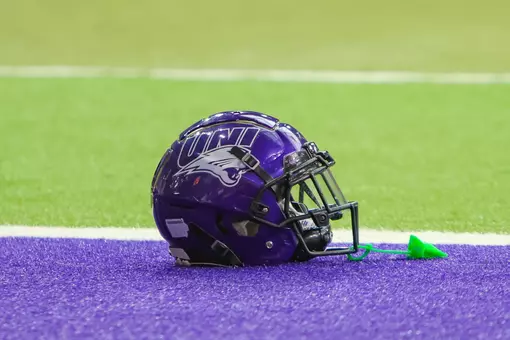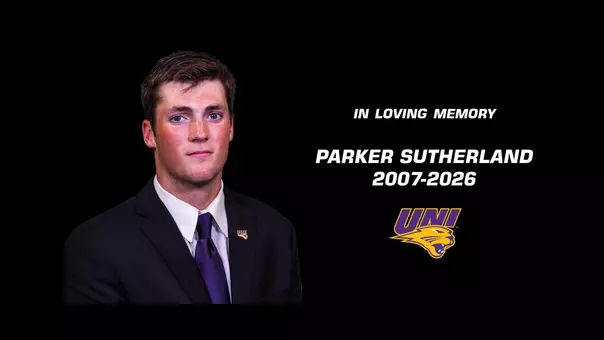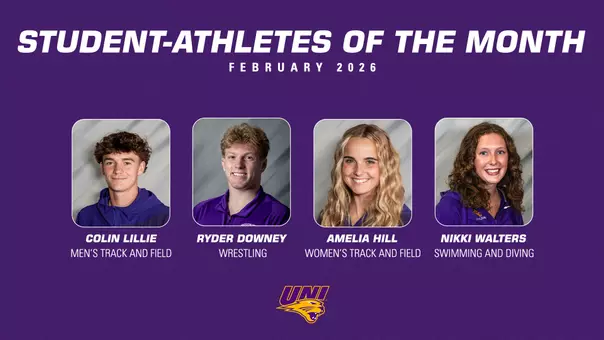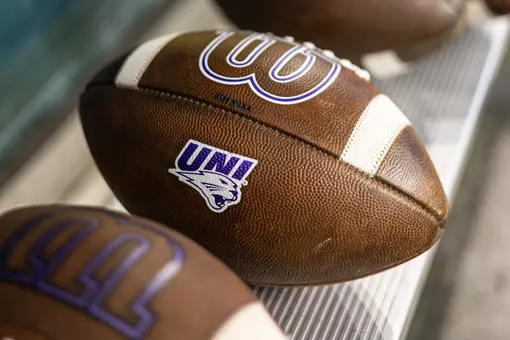University of Northern Iowa Athletics
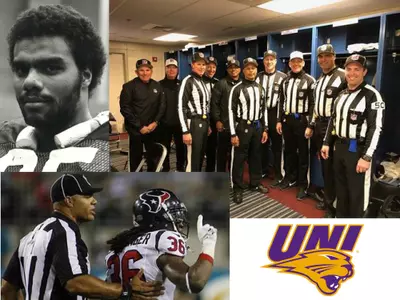
Black History Month Feature - Fred Bryan
2/28/2018 9:00:00 AM | Football, General
February is Black History Month, and the University of Northern Iowa will feature stories of African-Americans with ties to Panther athletic programs. The pieces will include the background of people of color and how those experiences relate to their playing or professional careers. The stories will be released each week in February.
Week One - Tanya Warren
Week Two - Mike Allen
Week Three – Reginald Green
Week Four – Fred Bryan
Next up is Fred Bryan, who played football at UNI from 1979-1982 and is currently an official in the National Football League.
Fred Bryan did not allow a mistake he made as a 17-year old in Minneapolis to detour his life.
Bryan learned from that misstep and has helped others turn their lives around in juvenile corrections.
"I was 17 years old and a few of us stole a car," Bryan said. "They pulled us over, and I landed in a juvenile corrections facility in Hennepin County. Mistakes you make as a juvenile don't have to follow you into the adult world. It doesn't have to be the end of the line."
 Bryan got a second chance and earned a scholarship to play football at the University of Northern Iowa. He enrolled at UNI in 1979 and played junior varsity for the Panthers his first year. He improved his play and earned a spot on the Panther football team in 1980 and played three seasons for head coach Stan Sheriff.
Bryan got a second chance and earned a scholarship to play football at the University of Northern Iowa. He enrolled at UNI in 1979 and played junior varsity for the Panthers his first year. He improved his play and earned a spot on the Panther football team in 1980 and played three seasons for head coach Stan Sheriff.
Bryan saw action in 33 games and made 69 career tackles. He also registered two quarterback sacks and recovered a pair of fumbles for the Panthers.
"We were a Division II school when I got there and transitioned to I-AA," Bryan said. "We were switching conferences. We also played so many different schools and traveled to a lot of different places than we were used to during the transition. One of my highlights was being selected as the Chevrolet Scholarship player of the game when we played on ABC against South Dakota (Nov. 15, 1980)."
Bryan said one teammate always stood out to him.
"Joe Anderson was a linebacker from Waterloo. He was a local hometown hero," Bryan said. "We were both on the defensive side of the ball. He was just a really good guy and friend. He would pump everybody up. He would inspire me by how hard he worked on the football field as well as in the classroom."
There are two professors that left their mark on Bryan from his days at UNI – his adviser and sociology professor Mitchell Greene and Clemens Bartollas, a professor of sociology, anthropology and criminology.
"Mitchell Greene was one of the first good role models I had for an African-American man. He was a tenured professor, and he always dressed in a suit. He rocked the bow tie. He treated everyone in a professional manner," Bryan said. "Clem Bartollas was the other one. He was a cool, crazy, white dude. I liked his style, and he was down to earth. He taught in a manner that didn't sugarcoat. He brought up tough issues that dealt with kids, adults and trauma. He kept it real."
Bartollas, who is known for his rigorous big paper assignments, talked about his first memories of Bryan as a student at UNI.
"Fred would sit in the first row of every class but he never said a word," Bartollas said. "I would grade the papers and he kept coming up with an A. I realized then that Fred isn't a talker but he's a thinker. He seemed to respond well with my teaching style. There was something different about Fred. He came from an urban area where sometimes you will find students are not very school oriented. But Fred had no trouble adjusting."
Bartollas has stayed in touch with Bryan through the years and speaks very highly of the man that used to sit in the front row of the classroom and barely said a word in that setting.
"Fred is a smart guy. He is very sincere," Bartollas said. "He possesses very good intuitive skills about people. He receives my top evaluation. Fred really has no negatives. I've written many books and I have always considered writing Fred's autobiography."
Bryan was at UNI when a black man by the name James "T-Bone" Taylor, was apprehended by authorities on July 17, 1981, after Taylor had murdered two white Waterloo police officers on July 12, 1981. He said it was a reminder about race relations and took him back to an earlier time as he witnessed the around-the-clock news coverage.
"I remember watching the news on this manhunt for T-Bone Taylor because there was news coverage all over the place," Bryan remembers. "I have vivid memories of the police cornering him in a cornfield, sending in the dogs and then pulling him out of the field with weeds and plants covering him. It was all over the news. It reminded me of the 1960s and how so many blacks were treated in the same manner. I was saying to myself 'What have I gotten myself into here?' In retrospect, he was wanted for a double murder and the police were doing the right thing. It was still surreal to see it all over the news for this hunt of a black man."
Following earning his degree in social work with a minor in corrections from UNI, Bryan returned to the Minneapolis area and came full circle as he took a job at Hennepin County department of juvenile corrections.
"When I first got into juvenile corrections in my early 20s, I was working at the same facility I was in as a resident just five years prior," Bryan said. "I was dealing with individuals that really weren't that much younger than I was."
Bryan also got interested in coaching in his return to Minneapolis and joined his high school coach from Minneapolis Central Richard Robinson on Robinson's coaching staff at Minneapolis North. Bryan coached for three years on the ninth- and 10th-grade teams and as an assistant on the varsity under Robinson. Bryan said he and Robinson had a conversation about Bryan's future in coaching.
"We had a heart-to-heart discussion that maybe I wasn't the best football coach and would I ever consider officiating," Bryan chuckled. "Coach Robinson was a well-respected, African-American man and another excellent role model for me. It may have been harsh for me to hear it, but he was able to steer me toward officiating, and it took off from there."
 Bryan started out officiating junior varsity games in the Minneapolis public schools before latching on to a varsity crew. Bryan continued to advance and eventually worked his way up to junior college games and NCAA Division III games, where he got his opportunity of a lifetime.
Bryan started out officiating junior varsity games in the Minneapolis public schools before latching on to a varsity crew. Bryan continued to advance and eventually worked his way up to junior college games and NCAA Division III games, where he got his opportunity of a lifetime.
"I was working a Division III St. Thomas game in Minneapolis, and it happened that the Minnesota Vikings had a home game that weekend," Bryan said. "Some National Football League officiating observers would check out games in the area when they were around, and they came to the St. Thomas game. After the game, I got an email from the scout who was at the game. He asked if I would consider applying to work in the NFL. It took me about two seconds to say 'Yes'."
Bryan attended clinics and officiating seminars across the country. He also worked on a full-time crew in the Big Ten Conference beginning in 2007 working two bowl games. He also was assigned to NFL Europe and worked over there for two summers in 2006 and 2007 officiating the last World Bowl.
 Bryan got called up to the NFL in 2009 and has been the umpire on the Tony Corrente and Brad Allen crews. He worked his first AFC Championship game this season when the New England Patriots played the Jacksonville Jaguars.
Bryan got called up to the NFL in 2009 and has been the umpire on the Tony Corrente and Brad Allen crews. He worked his first AFC Championship game this season when the New England Patriots played the Jacksonville Jaguars.
"I've worked seven playoff games and have been an alternate in a Super Bowl – but it wasn't on the field," Bryan said. "My goal is to get on the field for a Super Bowl."
Bryan and his wife, Jenny, reside in Minneapolis. The couple has two daughters, Adara (30) and Ellie (28).
Week One - Tanya Warren
Week Two - Mike Allen
Week Three – Reginald Green
Week Four – Fred Bryan
Next up is Fred Bryan, who played football at UNI from 1979-1982 and is currently an official in the National Football League.
Bryan learned from that misstep and has helped others turn their lives around in juvenile corrections.
"I was 17 years old and a few of us stole a car," Bryan said. "They pulled us over, and I landed in a juvenile corrections facility in Hennepin County. Mistakes you make as a juvenile don't have to follow you into the adult world. It doesn't have to be the end of the line."
 Bryan got a second chance and earned a scholarship to play football at the University of Northern Iowa. He enrolled at UNI in 1979 and played junior varsity for the Panthers his first year. He improved his play and earned a spot on the Panther football team in 1980 and played three seasons for head coach Stan Sheriff.
Bryan got a second chance and earned a scholarship to play football at the University of Northern Iowa. He enrolled at UNI in 1979 and played junior varsity for the Panthers his first year. He improved his play and earned a spot on the Panther football team in 1980 and played three seasons for head coach Stan Sheriff.Bryan saw action in 33 games and made 69 career tackles. He also registered two quarterback sacks and recovered a pair of fumbles for the Panthers.
"We were a Division II school when I got there and transitioned to I-AA," Bryan said. "We were switching conferences. We also played so many different schools and traveled to a lot of different places than we were used to during the transition. One of my highlights was being selected as the Chevrolet Scholarship player of the game when we played on ABC against South Dakota (Nov. 15, 1980)."
Bryan said one teammate always stood out to him.
"Joe Anderson was a linebacker from Waterloo. He was a local hometown hero," Bryan said. "We were both on the defensive side of the ball. He was just a really good guy and friend. He would pump everybody up. He would inspire me by how hard he worked on the football field as well as in the classroom."
There are two professors that left their mark on Bryan from his days at UNI – his adviser and sociology professor Mitchell Greene and Clemens Bartollas, a professor of sociology, anthropology and criminology.
"Mitchell Greene was one of the first good role models I had for an African-American man. He was a tenured professor, and he always dressed in a suit. He rocked the bow tie. He treated everyone in a professional manner," Bryan said. "Clem Bartollas was the other one. He was a cool, crazy, white dude. I liked his style, and he was down to earth. He taught in a manner that didn't sugarcoat. He brought up tough issues that dealt with kids, adults and trauma. He kept it real."
Bartollas, who is known for his rigorous big paper assignments, talked about his first memories of Bryan as a student at UNI.
"Fred would sit in the first row of every class but he never said a word," Bartollas said. "I would grade the papers and he kept coming up with an A. I realized then that Fred isn't a talker but he's a thinker. He seemed to respond well with my teaching style. There was something different about Fred. He came from an urban area where sometimes you will find students are not very school oriented. But Fred had no trouble adjusting."
Bartollas has stayed in touch with Bryan through the years and speaks very highly of the man that used to sit in the front row of the classroom and barely said a word in that setting.
"Fred is a smart guy. He is very sincere," Bartollas said. "He possesses very good intuitive skills about people. He receives my top evaluation. Fred really has no negatives. I've written many books and I have always considered writing Fred's autobiography."
Bryan was at UNI when a black man by the name James "T-Bone" Taylor, was apprehended by authorities on July 17, 1981, after Taylor had murdered two white Waterloo police officers on July 12, 1981. He said it was a reminder about race relations and took him back to an earlier time as he witnessed the around-the-clock news coverage.
"I remember watching the news on this manhunt for T-Bone Taylor because there was news coverage all over the place," Bryan remembers. "I have vivid memories of the police cornering him in a cornfield, sending in the dogs and then pulling him out of the field with weeds and plants covering him. It was all over the news. It reminded me of the 1960s and how so many blacks were treated in the same manner. I was saying to myself 'What have I gotten myself into here?' In retrospect, he was wanted for a double murder and the police were doing the right thing. It was still surreal to see it all over the news for this hunt of a black man."
Following earning his degree in social work with a minor in corrections from UNI, Bryan returned to the Minneapolis area and came full circle as he took a job at Hennepin County department of juvenile corrections.
"When I first got into juvenile corrections in my early 20s, I was working at the same facility I was in as a resident just five years prior," Bryan said. "I was dealing with individuals that really weren't that much younger than I was."
Bryan also got interested in coaching in his return to Minneapolis and joined his high school coach from Minneapolis Central Richard Robinson on Robinson's coaching staff at Minneapolis North. Bryan coached for three years on the ninth- and 10th-grade teams and as an assistant on the varsity under Robinson. Bryan said he and Robinson had a conversation about Bryan's future in coaching.
"We had a heart-to-heart discussion that maybe I wasn't the best football coach and would I ever consider officiating," Bryan chuckled. "Coach Robinson was a well-respected, African-American man and another excellent role model for me. It may have been harsh for me to hear it, but he was able to steer me toward officiating, and it took off from there."
 Bryan started out officiating junior varsity games in the Minneapolis public schools before latching on to a varsity crew. Bryan continued to advance and eventually worked his way up to junior college games and NCAA Division III games, where he got his opportunity of a lifetime.
Bryan started out officiating junior varsity games in the Minneapolis public schools before latching on to a varsity crew. Bryan continued to advance and eventually worked his way up to junior college games and NCAA Division III games, where he got his opportunity of a lifetime."I was working a Division III St. Thomas game in Minneapolis, and it happened that the Minnesota Vikings had a home game that weekend," Bryan said. "Some National Football League officiating observers would check out games in the area when they were around, and they came to the St. Thomas game. After the game, I got an email from the scout who was at the game. He asked if I would consider applying to work in the NFL. It took me about two seconds to say 'Yes'."
Bryan attended clinics and officiating seminars across the country. He also worked on a full-time crew in the Big Ten Conference beginning in 2007 working two bowl games. He also was assigned to NFL Europe and worked over there for two summers in 2006 and 2007 officiating the last World Bowl.
 Bryan got called up to the NFL in 2009 and has been the umpire on the Tony Corrente and Brad Allen crews. He worked his first AFC Championship game this season when the New England Patriots played the Jacksonville Jaguars.
Bryan got called up to the NFL in 2009 and has been the umpire on the Tony Corrente and Brad Allen crews. He worked his first AFC Championship game this season when the New England Patriots played the Jacksonville Jaguars."I've worked seven playoff games and have been an alternate in a Super Bowl – but it wasn't on the field," Bryan said. "My goal is to get on the field for a Super Bowl."
Bryan and his wife, Jenny, reside in Minneapolis. The couple has two daughters, Adara (30) and Ellie (28).
UNI Panther Football: The Best Pod of your Day (Offseason Episode 1)
Wednesday, February 25
UNI Football Head Coach Todd Stepsis Remarks - Feb. 16, 2026
Tuesday, February 17
Panther Conversations - Week 2
Wednesday, February 04
Panther Conversations - Week 1
Wednesday, January 14

